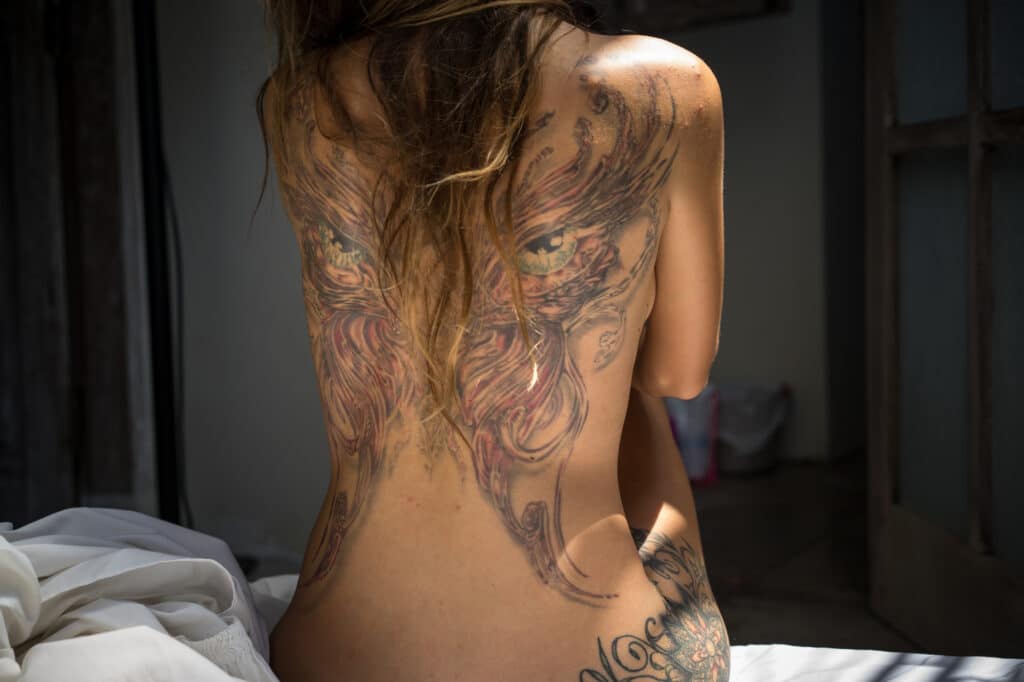Hi Chirpers, today, on the New Year’s Eve I want to touch on an ethical question that I have been pondering on for sometime i.e. Should I get a tattoo in the New Year?
As you know, Embarking on the journey of self-expression through body art often involves making choices that resonate with our values. For the eco-conscious and animal-friendly souls, there’s a question that frequently buzzes beneath the surface: Is your tattoo genuinely in harmony with Mother Nature’s ethos?, Is Your Tattoo Truly Vegan?
As I’ve mulled over this for quite some time, in fact a long long time, I think it’s about time to dive into the verdant world of vegan tattoos to unravel the complexities of tattoo ink ingredients.
Join me as I reveal the hidden truths and help you ensure that your ink aligns with your compassionate lifestyle.
Exploring Vegan Tattoo Ink: Is Your Tattooing Truly Cruelty-Free?

When you’re on the quest for a tattoo that aligns with your ethical choices, you may – like me, ponder if your preferred body art is really embracing all things cruelty-free.
Vegan tattoo inks are the cornerstone of vegan tattoos, providing a compassionate alternative to traditional inks without skimping on quality or vibrance. But not all tattoo inks are created equal.
In fact, without doing your homework, you might inadvertently select non-vegan tattoo inks that can contain anything from bone char to glycerin derived from animal fat or even gelatin. The shocker for many is discovering that some tattoo inks are actually made with animal products, which certainly puts a damper on your commitment to avoid cruelty.
Vegan tattoo ink, however, avoids such ingredients, ensuring that your tattoo vegan aesthetic is maintained from start to finish. By choosing vegan ink, you align with the ethics of avoiding animal exploitation, embracing an eco-conscious lifestyle that vegan tattoos represent.
But let’s delve deeper. Truly vegan tattooing goes beyond just the ink—everything from the stencil paper to the aftercare products should be free of animal-derived constituents to consider your tattoos vegan through and through.
Demand for vegan tattoo inks has burgeoned, with artists and clients alike seeking transparency in ingredients. Tattoo inks labeled as vegan offer peace of mind, certifying that the tattooing process doesn’t compromise on kind living.
To ensure that your tattoo inks are genuinely vegan, engaging in a discussion with your tattoo artist is crucial. Inquisitive about the inks they use? Don’t hesitate to ask for an ingredients list—it’s your skin, your values, and your right to know.
Embrace the realm of vegan tattoos with confidence, knowing that vegan inks can rival traditional inks in endurance and diversity of colors. The rise of genuinely vegan options speaks volumes about the evolving landscape of conscious consumerism. Tattoo vegan enthusiasts, it’s time to celebrate, for achieving a cruelty-free canvas has never been more accessible.
Here is my current up-to-date list of things, products I have written down that would go into my getting tattoo journey, if I ever (that is a massive IF!):
| Tattoo Item | Potential Non-Vegan Components | Vegan Alternatives |
|---|---|---|
| Ink | Glycerin (animal fat), bone char, gelatin, shellac | Plant-based glycerin, carbon or vegetable-based pigments |
| Stencil Paper | Lanolin (wool grease) | Vegetable-based or synthetic stencil papers |
| Transfer Solution | Glycerin (animal fat) | Plant-based glycerin or alcohol-based solutions |
| Ointments and Lotions | Lanolin, beeswax, gelatin | Shea butter, cocoa butter, plant-based oils |
| Aftercare Products | Beeswax, lanolin | Vegan aftercare products with natural oils and extracts |
| Razors | Gel strips with glycerin | Razors without gel strips or with plant-based strips |
| Needles | – (generally vegan) | – |
| Tattoo Machines | – (generally vegan) | – |
| Ink Cups | – (generally vegan) | – |
| Gloves | Latex (possible animal-based processing) | Nitrile or other synthetic, non-latex gloves |
| Disinfectants | – (check individual product for animal testing) | Cruelty-free disinfectants |
| Soap | Animal fats, glycerin | Vegan, glycerin-free soaps |
| Adhesive Bandages | Animal-derived adhesives | Synthetic adhesive bandages |
| Moisturizers for Preparation | Lanolin, animal fats | Vegan moisturizers with aloe or plant-based ingredients |
| Shading Liquid | Animal derivatives in some brands | Brands with plant-based or synthetic ingredients |
| Green Soap | Sometimes has animal fats | Pure vegetable oil-based green soap |
| Healing Balm | Beeswax, lanolin | Vegan balms with plant butters and oils |
| Wipes and Towels | Non-vegan processing | Biodegradable, cruelty-free wipes |
| Anesthetic Creams | Lanolin, beeswax | Vegan-formulated anesthetic creams |
| Chair/Bed Coverings | Leather coverings | Synthetic, leather-free materials |
The Hidden Animal Products in Tattoo Ink: Bone Char and Animal Fat
When you’re getting your tattoo, you’re likely pondering the artwork, the placement, and maybe the pain, but what about the ink itself? It might come as a shock, but some tattoo inks are actually laced with animal products. That’s right, your tattoos might not be as vegan as you think!
Bone char, commonly used to achieve the deep black hue in tattoo inks, is made by charring animal bones. It’s a hidden animal-derived ingredient that might be lurking in the shader of your tattoo ink. What about the brilliant shades of reds and yellows? Well, they’re not exempt either. Some bone char is sneakily included in pigments to enrich color vibrancy. Meanwhile, animal fat is another unwelcome guest; it can be found as a stabilizer in some tattoo inks—something that’s not often talked about out loud.
It’s quite unsettling that the tattoos we wear with pride could be harboring such secrets. The ink that you thought was simply carrying pigment could, in fact, be carrying traces of animals. And that’s not all; it’s not just bone char and animal fat you need to be wary of. Glycerin, a common ink carrier, is often derived from animal fats—though vegetable-derived versions are available. Similarly, gelatin, made from boiling animal parts, can be used to help keep the ink well-distributed.
But don’t be disheartened, as the tide is turning. Awareness is growing, and more studios are opting for truly vegan alternatives. You might be wondering, “How can I ensure my future tattoos are vegan?” It all starts with asking questions—inquiring about the tattoo inks and their ingredients is key.
As for your existing tattoos, the ink under the skin is already a done deal, but it can be a lesson learned for future ink sessions. Remember, true cruelty-free tattooing takes vigilance—because when it comes to the art etched into your skin, the devil is, quite literally, in the details.

How Your Lifestyle Choices Influence Your Tattoos: Going Vegan Beyond the Ink
Embracing a vegan lifestyle is not just about what’s on your plate but extends to all facets of life, including the world of tattoos. While many artists promote vegan living, ensuring that your tattoo is vegan demands scrutiny. Vegan artists and studios are emerging, creating a space where lifestyle and art harmoniously meet.
Discovering a tattoo artist with vegan sensitivities means you’ve found someone who understands the importance of using vegan products both during the tattooing process and for aftercare. Your tattoos are permanent symbols of your dedication to veganism, and finding a studio that carries the vegan trademark reassures that these symbols are ethically aligned with your values.
Health is another pivotal aspect when considering your tattoos. Vegan ink is a testimony to health-conscious choices, not only for ethical reasons but also because it’s often perceived to carry a lower risk of adverse reactions compared to traditional inks which may contain harmful substances like bone char or other animal fats.
Tattoo Aftercare with a Conscience: Ensuring Your Tattoo Products Are Vegan
Once you’ve adorned your skin with a vegan tattoo, the importance of tattoo aftercare can’t be overstated—especially if you’re keen on maintaining a lifestyle that’s as cruelty-free as the vegan ink beneath your skin. It’s a good idea to ponder over the aftercare products you’re applying to your tattoo.
After all, your tattoo deserves nothing but the best care to preserve its vibrancy and detail. Vegan aftercare is the way to go to ensure that your love for animals and the planet is reflected in every phase of getting a tattoo—from the inking to the healing.
Vegan aftercare ensures that every influence on the tattoo is respectful of animal welfare. Many products, often overlook how their ingredients, like beeswax or lanolin, conflict with a vegan lifestyle. The good news is that there are plenty of effective vegan tattoo aftercare options available.
Using vegan products for care ensures that your tattoos not only heal properly but adhere to cruelty-free standards. So ask yourself, are the tattoos adorning your body as vegan as the food you eat?
FAQs
Can traditional tattoo inks contain animal products?
Yes, traditional tattoo inks can indeed contain animal products. Ingredients such as bone char, glycerin derived from animal fat, and gelatin are sometimes used in non-vegan tattoo inks to achieve certain colors and consistency.
What are vegan tattoo inks made of, and do they offer the same quality?
Vegan tattoo inks avoid animal-derived ingredients, using plant-based glycerin, and other synthetic or natural alternatives to ensure the ink is cruelty-free. They can match the quality, vibrance, and durability of traditional inks, offering a compassionate choice without compromising on performance.
How can I ensure my tattoo process is completely vegan?
To ensure your tattoo process is vegan, have an open discussion with your tattoo artist about the inks and other products used. Request an ingredients list for the inks, and confirm that stencil papers, aftercare products, and any other items used during the tattooing process are free from animal-derived ingredients.
Why is it important to choose vegan aftercare products for my tattoo?
Choosing vegan aftercare products for your tattoo is crucial to maintain a cruelty-free regimen. Vegan aftercare ensures that you’re not compromising your values while healing your tattoo, and it aligns with sustainable and ethical practices by avoiding ingredients like beeswax or lanolin, which are derived from animals.
Where can I find a tattoo artist or studio that specialises in vegan tattoos?
Finding a tattoo artist or studio that specializes in vegan tattoos has become easier as demand has grown. You can start by researching online for vegan tattoo studios or artists near you, checking social media platforms, or looking for recommendations in vegan communities. Don’t hesitate to contact studios directly to inquire about their vegan practices.

